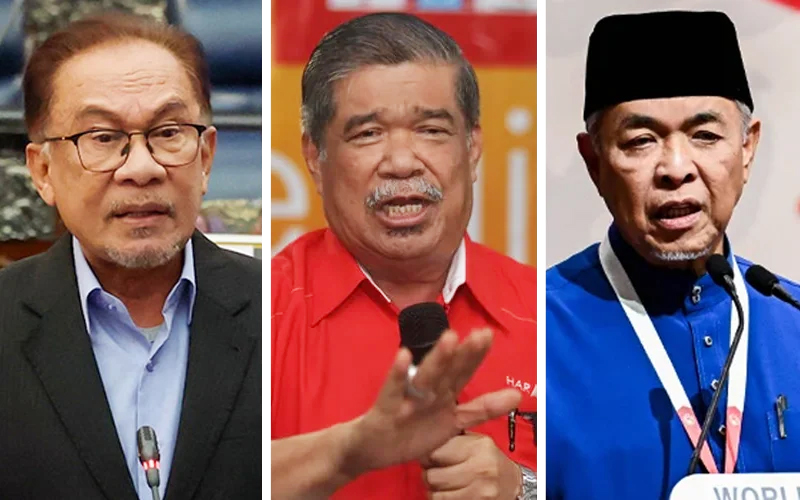FMT:
Weak ‘Malay pillars’ make DAP seem stronger, says analyst
Malay voters don’t see PKR, Amanah and Umno as defending their interests, says Azmi Hassan.

The weakness of Anwar Ibrahim’s Malay coalition partners has cost his government its legitimacy among Malay voters, says an analyst.
PETALING JAYA: The weakness of the “Malay pillars” of Anwar Ibrahim’s government has left the DAP as being perceived by Malay voters as the strongest party in the unity government, says a political analyst.
Azmi Hassan of Akademi Nusantara said the issue lay with PKR, Amanah and Umno, which he described as the “Malay pillars” of the coalition, rather than Anwar himself.
He told FMT that the three parties had failed to woo Malay support for the government since its formation.
“The perception (Malay voters have) is that DAP is much, much stronger (than the three parties). They don’t see these parties as currently being capable of defending their religious and ‘Bangsa Melayu’ interests.
“That is why the unity government is lacking legitimacy in the eyes of the Malays, which we saw from the results of the 15th general election,” he said.
While admitting that PKR was the best multiracial platform, Azmi said Anwar’s party was still struggling to win over Malay voters. He said Umno remained the best bet in the coalition to gain the community’s support, if the party would embrace more reforms.
He added that the unity coalition could make inroads in the Malay heartland in the coming state assembly elections if Umno members elected reform-minded leaders.
Last week, political analyst Ahmad Fauzi Abdul Hamid said the biggest weakness of the government was its lack of legitimacy in the eyes of the Malays.
Fauzi, of Universiti Sains Malaysia, said Anwar was trying to shore up support from the Malays but there was still not enough backing from the community.
Azmi agreed with Fauzi, saying Anwar was doing his best to provide incentives and perks for the Malay, Muslim and Bumiputera communities in the 2023 budget.
However, Pasir Gudang MP Hassan Karim said the government should refrain from taking a communal-based approach in solving the people’s problems and adopt a needs-based approach instead.
The PKR MP believed that Anwar and Pakatan Harapan were capable of delivering policies that looked after the people’s welfare regardless of race.
“The real beneficiary would be the Malays because they make up the majority in the B40 socioeconomic stratum,” said the two-time MP.
Awang Azman Pawi of Universiti Malaya agreed, saying Anwar should endeavour to uplift the wellbeing of lower and middle-income Malaysians and combat corruption to obtain legitimacy in the eyes of the Malay populace.
He added that promoting “economic justice” and fighting corruption were among the core tenets of Islam, and would naturally win Malay support.
PETALING JAYA: The weakness of the “Malay pillars” of Anwar Ibrahim’s government has left the DAP as being perceived by Malay voters as the strongest party in the unity government, says a political analyst.
Azmi Hassan of Akademi Nusantara said the issue lay with PKR, Amanah and Umno, which he described as the “Malay pillars” of the coalition, rather than Anwar himself.
He told FMT that the three parties had failed to woo Malay support for the government since its formation.
“The perception (Malay voters have) is that DAP is much, much stronger (than the three parties). They don’t see these parties as currently being capable of defending their religious and ‘Bangsa Melayu’ interests.
“That is why the unity government is lacking legitimacy in the eyes of the Malays, which we saw from the results of the 15th general election,” he said.
While admitting that PKR was the best multiracial platform, Azmi said Anwar’s party was still struggling to win over Malay voters. He said Umno remained the best bet in the coalition to gain the community’s support, if the party would embrace more reforms.
He added that the unity coalition could make inroads in the Malay heartland in the coming state assembly elections if Umno members elected reform-minded leaders.
Last week, political analyst Ahmad Fauzi Abdul Hamid said the biggest weakness of the government was its lack of legitimacy in the eyes of the Malays.
Fauzi, of Universiti Sains Malaysia, said Anwar was trying to shore up support from the Malays but there was still not enough backing from the community.
Azmi agreed with Fauzi, saying Anwar was doing his best to provide incentives and perks for the Malay, Muslim and Bumiputera communities in the 2023 budget.
However, Pasir Gudang MP Hassan Karim said the government should refrain from taking a communal-based approach in solving the people’s problems and adopt a needs-based approach instead.
The PKR MP believed that Anwar and Pakatan Harapan were capable of delivering policies that looked after the people’s welfare regardless of race.
“The real beneficiary would be the Malays because they make up the majority in the B40 socioeconomic stratum,” said the two-time MP.
Awang Azman Pawi of Universiti Malaya agreed, saying Anwar should endeavour to uplift the wellbeing of lower and middle-income Malaysians and combat corruption to obtain legitimacy in the eyes of the Malay populace.
He added that promoting “economic justice” and fighting corruption were among the core tenets of Islam, and would naturally win Malay support.
No comments:
Post a Comment